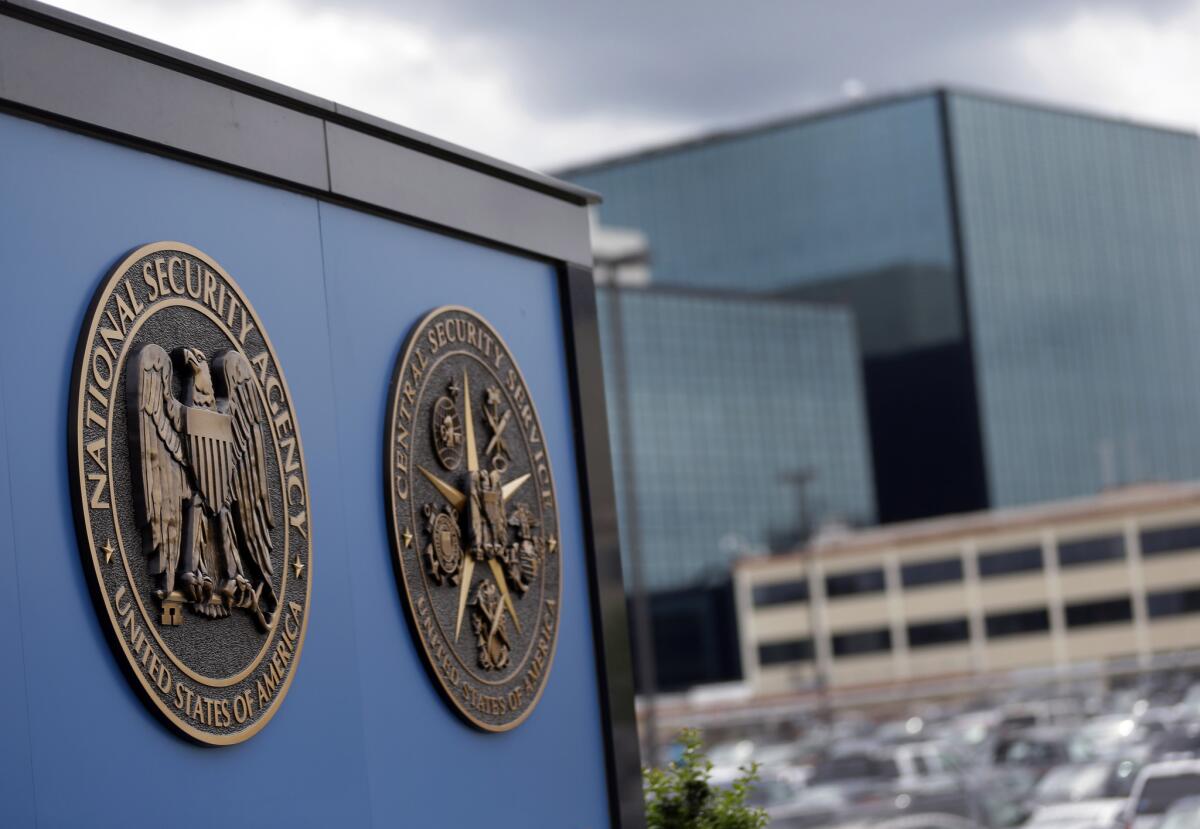Stay calm and let the NSA carry on

- Share via
After 9/11, there was a widespread expectation of many more terrorist attacks on the United States. So far that hasn’t happened. We haven’t escaped entirely unscathed (see Boston Marathon, bombing of), but on the whole we have been a lot safer than most security experts, including me, expected. In light of the current controversy over the National Security Agency’s monitoring of telephone calls and emails, it is worthwhile to ask: Why is that?
It is certainly not due to any change of heart among our enemies. Radical Islamists still want to kill American infidels. But the vast majority of the time, they fail. The Heritage Foundation estimated last year that 50 terrorist attacks on the American homeland had been foiled since 2001. Some, admittedly, failed through sheer incompetence on the part of the would-be terrorists. For instance, Faisal Shahzad, a Pakistani American jihadist, planted a car bomb in Times Square in 2010 that started smoking before exploding, thereby alerting two New Yorkers who in turn called police, who were able to defuse it.
But it would be naive to adduce all of our security success to pure serendipity. Surely more attacks would have succeeded absent the ramped-up counter-terrorism efforts undertaken by the U.S. intelligence community, the military and law enforcement.
And a large element of the intelligence community’s success lies in its use of special intelligence — that is, communications intercepts. The CIA is notoriously deficient in human intelligence — infiltrating spies into terrorist organizations is hard to do, especially when we have so few spooks who speak Urdu, Arabic, Persian and other relevant languages. But the NSA is the best in the world at intercepting communications. That is the most important technical advantage we have in the battle against fanatical foes who will not hesitate to sacrifice their lives to take ours.
Which brings us to the current kerfuffle over two NSA monitoring programs that have been exposed by the Guardian and the Washington Post. One program apparently collects metadata on all telephone calls made in the United States. Another program provides access to all the emails, videos and other data found on the servers of major Internet firms such as Google, Apple and Microsoft.
At first blush these intelligence-gathering activities raise the specter of Big Brother snooping on ordinary American citizens who might be cheating on their spouses or bad-mouthing the president. In fact, there are considerable safeguards built into both programs to ensure that doesn’t happen. The phone-monitoring program does not allow the NSA to listen in on conversations without a court order. All that it can do is to collect information on the time, date and destination of phone calls. It should go without saying that it would be pretty useful to know if someone in the U.S. is calling a number in Pakistan or Yemen that is used by a terrorist organizer.
As for the Internet-monitoring program, reportedly known as PRISM, it is apparently limited to “non-U.S. persons” who are abroad and thereby enjoy no constitutional protections.
These are hardly rogue operations. Both programs were initiated by President George W. Bush and continued by President Obama with the full knowledge and support of Congress and continuing oversight from the federal judiciary. That’s why the leaders of both the House and Senate intelligence committees, Republicans and Democrats alike, have come to the defense of these activities.
It’s possible that, like all government programs, these could be abused — see, for example, the IRS making life tough on tea partiers. But there is no evidence of abuse so far and plenty of evidence — in the lack of successful terrorist attacks — that these programs have been effective in disrupting terrorist plots.
Granted there is something inherently creepy about Uncle Sam scooping up so much information about us. But Google, Facebook, Amazon, Twitter, Citibank and other companies know at least as much about us, because they use very similar data-mining programs to track our online movements. They gather that information in order to sell us products, and no one seems to be overly alarmed. The NSA is gathering that information to keep us safe from terrorist attackers. Yet somehow its actions have become a “scandal,” to use a term now loosely being tossed around.
The real scandal here is that the Guardian and Washington Post are compromising our national security by telling our enemies about our intelligence-gathering capabilities. Their news stories reveal, for example, that only nine Internet companies share information with the NSA. This is a virtual invitation to terrorists to use other Internet outlets for searches, email, apps and all the rest.
No intelligence effort can ever keep us 100% safe, but to stop or scale back the NSA’s special intelligence efforts would amount to unilateral disarmament in a war against terrorism that is far from over.
Max Boot, a contributing editor to Opinion, is a senior fellow at the Council on Foreign Relations and author of “Invisible Armies: An Epic History of Guerrilla Warfare from Ancient Times to the Present.”
More to Read
A cure for the common opinion
Get thought-provoking perspectives with our weekly newsletter.
You may occasionally receive promotional content from the Los Angeles Times.










